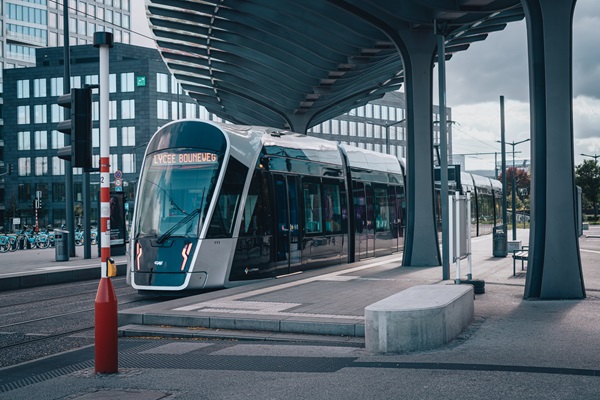
On Thursday 1 February 2024, Luxembourg's Chamber of Deputies unanimously approved the bill on the construction of extensions of the tram line in Luxembourg between the Rout Bréck-Pafendall and Laangfur stations in Kirchberg and between the Gare Centrale and Hollerich.
This includes the work necessary for the construction of the infrastructure of the lines themselves, the environmental compensation measures and the related studies.
These extensions align with the National Mobility Plan 2035 (PNM 2035), which defines the organisation and deployment of infrastructure aiming to increase transport capacity by 40% compared to that established in 2017. The long-term vision of the Luxembourg tram network proposes a structure focused on intermodal transportation, in collaboration with other mobility players in the country. It is a reasoned network, designed to increase connection points and optimise travel.
According to Luxembourg’s Ministry of Mobility and Public Works, this law represents a crucial step on several levels. In a context where certain branches of activity in the construction sector are experiencing a period of crisis, public project owners need to pursue essential and significant projects, such as the extension of the tram network. This is of particular importance, given that the majority of public investments will benefit Luxembourg companies.
In parallel with the development of the Kirchberg plateau and the Porte de Hollerich, two extensions of the tramway will therefore be built according to the evolution of the new districts: K2 and HO.
The extension of the tram from Luxembourg’s central station (Gare Centrale) to the Hollerich district: the extension of the tram line (HO line) will be carried out in two stages. A first stage (A), commissioned and planned for 2028, branches off the existing line after the Gare Centrale station and aims to provide service to the future “Nei Hollerich” district as well as its Hollerich interchange hub. This route, made up of two tracks over a length of 1.1 km, includes two new stations. Moreover, it includes the tram platform, the stations and all the tram systems and equipment, including the overhead contact power supply. The cost of this extension amounts to €29,000,000 excluding VAT.
In a later stage, this new branch will be extended to the future “Porte de Hollerich” district and the P&R Bouillon.
The extension of the tram to the “Laangfur” district in Kirchberg: Line K2 will also be carried out in two stages. The first stage (A) on the double track extends over 2.3 km and includes three new stations. This branches off the existing line near the Rout Bréck-Pafendall station to reach the future mixed neighbourhood “Laangfur”. The start of work is planned for next year and entry into service in 2027. The insertion of the tramway in this section entails a complete overhaul of the layout of the public space, from facade to facade. The cost associated with this extension is estimated at €106,000,000 excluding VAT. In a second stage, the tramway will connect the future Kuebebierg district before joining, via Boulevard Pierre Frieden, the “Luxexpo” exchange hub.
Luxembourg’s Minister of Mobility and Public Works, Yuriko Backes, welcomed the vote of the Chamber of Deputies and emphasised: “This favourable vote allows us to continue the ‘success story’ of the tram. Today, an average of 107,000 passengers use the tram every day, and I would like to see this number increase even further while strengthening the resilience of the network. The tram goes beyond just being a means of transport! Important neighbourhoods will be connected to the tram, which will allow us to reach an even wider audience. By developing public space, whether by constructing green platforms, planting trees or optimizing pedestrian and cycle paths, the tram will contribute to improving the overall well-being of society.”
The total funding for the construction of the K2A and HOA sections amounts to €135,000,000 excluding VAT, of which €90,000,000 excluding VAT will come from the State, with the City of Luxembourg assuming its remaining part of the costs amounting to €45,000.000 € excluding VAT.








